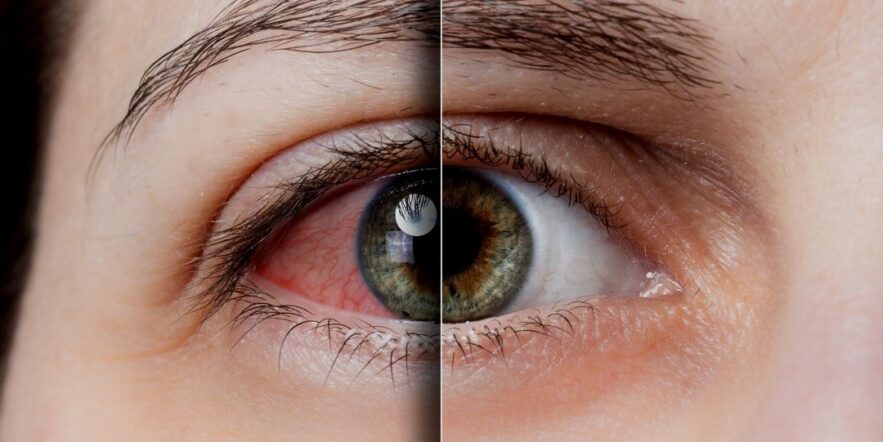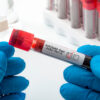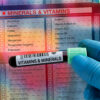Dry eye disease is irritating and painful. As an optometrist, I know there are many possible causes, but thedrugs you take might be the culprit.
Drugs are a common part of American life, 36% of people between the ages of 18-44 take between one and four medicines daily and that rises quickly to 90% of seniors take at least one daily drug. 42% of seniors are taking five or more drugs. Many drugs have side effects and some can cause dry eye disease. The more drugs you’re taking, the higher the likelihood of experiencing side effects.
What is Dry Eye Disease and which Drugs can cause it ?
We see patients when their eyes are red, stinging, burning or scratchy. There could be mucus around the eyes or sensitivity to light. Blurred eyes, tired eyes, sensitivity to light and watery eyes common with eye disease. It makes wearing contacts or driving at night very difficult.
Dry eye disease affects over 30 million Americans, and this number is increasing. There are two forms of dry eye: not enough tears which is called aqueous deficient dry eye and is caused by something affecting the lacrimal gland. The other is evaporative dry eye, which means the meibomian glands in the eyelids are not producing enough oil for your tears.
An adequate, healthy quantity of both aqueous (watery tears) and oil is needed for the tear film to properly lubricate the eyes and keep you comfortable.
Unfortunately, many of the prescription medications taken on a regular basis can cause debilitating dry eye disease. If you’ve ever noticed your eyes becoming dry, scratchy, irritated, or red, the cause may lie in your medicine cabinet.
Antihistamines and Decongestants
Antihistamines are simply medications that block histamine receptors. Similarly, decongestants decrease mucus production and swelling by targeting alpha-adrenergic receptors. Both target the nasal mucosal area, which includes the eyes. By drying out those areas, antihistamines and decongestants work to decrease your runny or congested nose, but they have the well known and unfortunate side effect of causing extreme dryness in your eyes.
If you’re currently taking either of these medications to fight allergies or sinus issues, consider speaking with your doctor about alternative treatments. Decongestants are the worst offenders, so if you can avoid them altogether it’s best to do so. When it’s not allergy season for you, avoid these medications whenever possible to avoid dry eye.
Antidepressants and Antipsychotics
Antidepressants and similar medications work by rerouting and reinterpreting messages in your brain, and because of this they have the well known side effect of dry eye. These medications disrupt messages your brain receives from the cornea, or the front surface of your eye, as well as the optic nerve in the back of the eye.
Because of this, it’s possible that your brain will not realize your eyes are dry, and therefore will not respond to the need for tear production. Tear production is necessary for comfortable eyes because, without it, the eyes become dehydrated, form dry patches on the surface, and affect your vision.
Other side effects of antidepressants and antipsychotics that affect the eyes include blurred vision, eye pain, eyelid inflammation, and even double vision. If you’re taking one of these medications, talk with your doctor about other options. While many people need these medications to live a normal life, there are other ways to treat these conditions that may be better alternatives to harsh chemicals.
High Blood Pressure Drugs can cause Dry Eye Disease
Many people are taking medications for high blood pressure, and those who are may notice that they’ve developed very dry eyes. For example, beta blockers may be prescribed for hypertension, migraines, and other heart conditions, but they are known to reduce the production of liquid from the lacrimal gland. In addition to this, diuretics are known to do the same, as these medications increase the excretion of water from the body. Doing so is going to dry your eyes out as well as the rest of your body.
While I won’t suggest that you stop taking your high blood pressure medication without consulting your doctor (a heart attack is more deadly than dry eye disease), I will suggest that there are better ways to combat this disease. A whole foods, plant-based diet is one of the best ways to manage blood pressure and other chronic diseases. Moving your body will also help keep your blood pressure at an optimal level, and drinking enough water throughout the day is also beneficial. I recommend my patients drink half their body weight in ounces of water per day (75 ounces for a 150 pound person), but you’ll want to discuss this with your doctor.
Accutane
One of the worst offenders, Accutane, and the generic isotretinoin, are known to destroy the meibomian glands. These small oil glands in the eyelids produce the oily portion of the tear film, and they’re necessary to maintain comfort of the eyes. Isotretinoin medications effectively shrink sebaceous oil glands throughout the body (these glands secrete a lubricating oily matter into the hair follicles to lubricate the skin and hair). Shrinking the sebaceous oil glands cause dry mouth and dry eyes, among other alarming side effects. Since the meibomian glands are sebaceous glands, you’re often left with minimal viable glands that may never regenerate and create only minimal (if any) oil production.
Unfortunately, so many acne sufferers are made to believe that this medication is their ticket out of the devastating effects of acne. However, it can very well be the ticket to an even more devastating dry eye disease that will last a lifetime. If you’re considering taking this medication, please read about all of the side effects. Educate yourself on what can happen and know that many have already experienced these effects and are now living the rest of their lives with incredible discomfort.
If you suffer from acne, consider cleaning up your diet, testing for food sensitivities, and drinking more water. There are also many natural products and methods available at your disposal, and they won’t leave you with lasting side effects such as dry eye disease.
Urinary Incontinence and COPD drugs and dry eye disease
If you are taking a drug for urinary incontinence or COPD and have dry eyes, ask your doctor if your drug is an “anticholinergic.” That category of drugs can cause dry eyes and your doctor may offer alternative options for managing incontinence.
Chemotherapy and Radiation
Although unavoidable in many cases, chemotherapy and radiation procedures are well known to damage the eyes. Chemotherapy and radiation have the ability to affect the lacrimal gland and its ability to produce the watery portion of your tears. Radiation near the face can actually destroy the cells of the lacrimal gland.
Fortunately, many people will notice that their dry eye improves once chemotherapeutic medications have finished and are out of their system. Radiation does have the ability to cause lasting effects, but the majority of people will notice improvement after their therapy has completed. In the meantime, combat the symptoms of these medications with preservative free artificial tears, proper hydration, a clean diet and a great eyelid hygiene routine.
The medications listed above are just a few of the many pharmaceutical medications that are known to contribute to dry eye disease. If you suffer from this condition, consider working with your doctor on other ways to treat your conditions, minimizing the effects on your eyes.
References:
TFOS DEWS II – Pathophysiology
Dry Eye Findings Worsen With Anticholinergic Therapy in Patients With Urge Incontinence
Ocular Side Effects of Accutane Therapy






